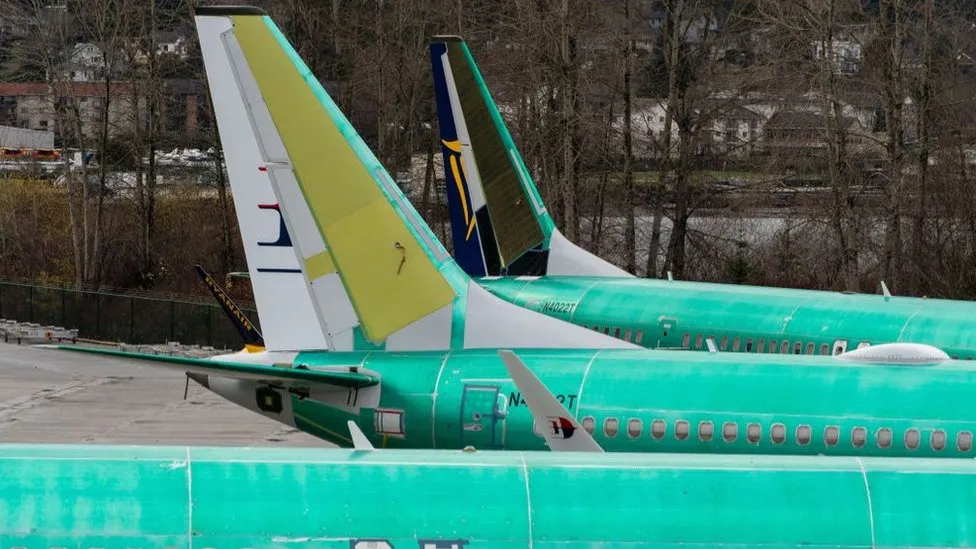Boeing boss Dave Calhoun will leave at the end of this year amid a deepening crisis over the firm’s safety record.
Boeing also said that the head of its commercial airlines division will retire immediately while its chairman will not stand for re-election.
The firm is under pressure after an unused door blew out of a Boeing 737 Max in January shortly after take-off.
No-one was injured but the firm’s safety and quality control standards came under renewed scrutiny.
Many analysts said a change in Boeing’s leadership was overdue.
“A shake-up at the top is necessary,” said Stewart Glickman, equity analyst at CFRA Research, adding that he believed the current crisis stemmed from problems in the firm’s corporate culture that only fresh insight would be able to fix.

“I don’t think you can change the culture with internal voices because I think this has been modus operandi for this company for too long.”
Mr Calhoun took on the chief executive role in early 2020 after the previous boss, Dennis Muilenburg, was ousted in the aftermath of one of the biggest scandals in Boeing’s history.
Within the space of five months, two brand new 737 Max planes had been lost in almost identical accidents that claimed the lives of 346 passengers and crew.
A board member at the time, after being made boss Mr Calhoun promised to strengthen Boeing’s “safety culture” and “rebuild trust”.
However, in January this year a disused emergency exit door blew off a new Alaska Airlines Boeing 737 Max shortly after take-off from Portland International Airport.
An initial report from the US National Transportation Safety Board concluded that four bolts meant to attach the door securely to the aircraft had not been fitted.
Boeing is facing a criminal investigation into the incident itself, as well as legal action from passengers aboard the plane.
In a letter to staff on Monday, Mr Calhoun described the Alaska Airlines incident as a “watershed moment” for Boeing and said it had to respond with “humility and complete transparency”.
“The eyes of the world are on us, and I know that we will come through this moment a better company,” he said.
Air safety campaigner Ed Pierson, a former senior manager at Boeing’s 737 factory in Renton, Washington, said Mr Calhoun had had years to try to boost safety at the company.
“It’s been one failure after the other,” said Mr Pierson, who is now executive director at The Foundation for Aviation Safety.
“The company deserves much better leadership and the people who get on these airplanes deserve much better leadership.”
The blowout had tested Boeing’s relationships with its airline customers and regulators in Washington, reviving concerns that the company’s corporate culture had focused on speed ahead of safety.
The Federal Aviation Administration said earlier this month that a six-week audit of the 737 Max production process at Boeing and its supplier Spirit Aerosystems had found “multiple instances where the companies failed to comply with manufacturing quality control requirements”.
The findings came shortly after another report into Boeing’s safety culture by an expert panel found a “disconnect” between senior management and regular staff, as well as signs that staff were hesitant about reporting problems for fear of retaliation.
After the two plane crashes in October 2018 and 2019, it was found that flawed flight control software caused the incidents – details of which Boeing was accused of deliberately concealing from regulators.
The company agreed to pay $2.5bn (£1.8bn) to settle fraud charges and admitted deception, though in later court hearings it formally pleaded not guilty.
It subsequently faced widespread accusations that it had put profits ahead of passengers’ lives.
Mark Pegram, whose 25-year-old son Sam died when Ethiopian Airlines 737 Max crashed in 2019, said Mr Calhoun had appeared to have been brought in to say what investors wanted to hear and “not fix the cause of the problems that were making planes fall out of the sky”.
He said he was pleased by the change but disappointed it had taken so long.
“It’s something we’ve been calling for for quite some time now,” he said.
The crisis at Boeing has caused wider disruption in the travel industry as the company, one of the world’s two major jet-makers, slows its manufacturing lines to try to get a grip on the problems.
Airlines, including Ryanair, have warned of higher ticket prices and more limited flight schedules as they face delayed aircraft deliveries.
For Boeing, the slowdown is already generating multi-billion dollar charges, while rival Airbus gains advantage. The firm is also facing criticism it has failed to innovate.
Speculation has already started as to who might replace Mr Calhoun, but the pool of people with qualifications for such a job is small.
Air transport consultant John Strickland of JLS Consulting warned that the hard work for the company was still ahead.
“It’s all very well to get rid of people but what are you going to do to keep the steering the business,” Mr Strickland said. “This is much easier said than done.”
Shares in the company rose more than 1% after the changes were announced.
As well as Mr Calhoun, Stan Deal will leave his role as head of Boeing’s commercial airlines division immediately. He will be replaced by Stephanie Pope who has spent the past three months working as the Boeing’s chief operating officer.
Larry Kellner, the firm’s chair will also leave and be replaced by Steve Mollenkopf, the former boss of Qualcomm who has been a board member at Boeing since 2020. He will lead the search for a new chief executive.





